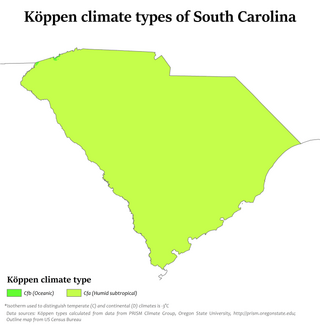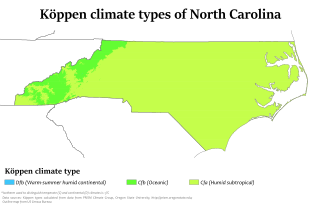Related Research Articles

Climate change adaptation is the process of adjusting to current or expected effects of climate change. For humans, adaptation aims to moderate or avoid harm, and exploit opportunities; for natural systems, humans may intervene to help adjustment. Adaptation actions can be either incremental or transformative. The need for adaptation varies from place to place, depending on the risk to human or ecological systems. Adaptation actions can be grouped into four categories: Infrastructural and technological options, institutional, behavioural and cultural; and nature-based options.

Climate change in South Asia is having significant impacts already which are expected to intensify as global temperatures rise due to climate change. The South Asia region consists of the eight countries Afghanistan, Pakistan, India, Nepal, Bhutan, Bangladesh, the Maldives and Sri Lanka. In the 2017 edition of Germanwatch's Climate Risk Index, Bangladesh and Pakistan ranked sixth and seventh respectively as the countries most affected by climate change in the period from 1996 to 2015, while India ranked fourth among the list of countries most affected by climate change in 2015. South Asia is one of the most vulnerable regions globally to a number of direct and indirect effects of climate change, including sea level rise, cyclonic activity, and changes in ambient temperature and precipitation patterns. Ongoing sea level rise has already submerged several low-lying islands in the Sundarbans region, displacing thousands of people.
Climate risk refers to risk assessments based on formal analysis of the consequences, likelihoods and responses to the impacts of climate change and how societal constraints shape adaptation options. Common approaches to risk assessment and risk management strategies based on natural hazards have been applied to climate change impacts although there are distinct differences. Based on a climate system that is no longer staying within a stationary range of extremes, climate change impacts are anticipated to increase for the coming decades despite mitigation efforts. Ongoing changes in the climate system complicates assessing risks. Applying current knowledge to understand climate risk is further complicated due to substantial differences in regional climate projections, expanding numbers of climate model results, and the need to select a useful set of future climate scenarios in their assessments.

In ecology, resilience is the capacity of an ecosystem to respond to a perturbation or disturbance by resisting damage and recovering quickly. Such perturbations and disturbances can include stochastic events such as fires, flooding, windstorms, insect population explosions, and human activities such as deforestation, fracking of the ground for oil extraction, pesticide sprayed in soil, and the introduction of exotic plant or animal species. Disturbances of sufficient magnitude or duration can profoundly affect an ecosystem and may force an ecosystem to reach a threshold beyond which a different regime of processes and structures predominates. When such thresholds are associated with a critical or bifurcation point, these regime shifts may also be referred to as critical transitions.

The effects of Climate change in Florida is attributable to man-made increases in atmospheric carbon dioxide. Floridians are experiencing increased flooding due to sea level rise, and are concerned about the possibility of more frequent or more intense hurricanes.

Water security is the focused goal of water policy and water management. A society with a high level of water security makes the most of water's benefits for humans and ecosystems and limits the risk of destructive impacts associated with water. These include too much water (flood), too little water or poor quality (polluted) water. A widely accepted definition of water security is: "Water security is the reliable availability of an acceptable quantity and quality of water for health, livelihoods and production, coupled with an acceptable level of water-related risks". Water security is framed as a situation where water-related risks are managed and water-related opportunities are captured but it is difficult to provide a set of indicators to quantify this.

Climate change in Sri Lanka is an important issue, and its effects threaten to impact both human and natural systems in Sri Lanka. Roughly 50 percent of its 22 million citizens live in low-lying coastal areas in the west, south, and south-west of the island, and are at risk of future sea level rise. Climate change also threatens the island's biodiversity, including its marine ecosystem and coastal coral reef environments. Sea-level rise due to climate change has the potential to affect the overall abundance of endemic species. Sri Lanka's coastal regions, such as the Northern Province and the Northern Western Province, are considered major hotspots and extremely vulnerable to climate change. These maritime provinces are the most densely populated. In addition to being a threat to Sri Lanka's biodiversity, climate change may cause disastrous consequences on various levels in such areas. Such consequences include: Affecting agricultural productivity, causing natural disasters like floods and droughts, increasing the spread of infectious illnesses, and finally undermining the living standards.

Climate change in Africa is an increasingly serious threat in Africa which is among the most vulnerable continents to the effects of climate change. Some sources even classify Africa as "the most vulnerable continent on Earth". This vulnerability is driven by a range of factors that include weak adaptive capacity, high dependence on ecosystem goods for livelihoods, and less developed agricultural production systems. The risks of climate change on agricultural production, food security, water resources and ecosystem services will likely have increasingly severe consequences on lives and sustainable development prospects in Africa. With high confidence, it was projected by the IPCC in 2007 that in many African countries and regions, agricultural production and food security would probably be severely compromised by climate change and climate variability. Managing this risk requires an integration of mitigation and adaptation strategies in the management of ecosystem goods and services, and the agriculture production systems in Africa.

Climate resilience is defined as the "capacity of social, economic and ecosystems to cope with a hazardous event or trend or disturbance". This is done by "responding or reorganising in ways that maintain their essential function, identity and structure while also maintaining the capacity for adaptation, learning and transformation". The key focus of increasing climate resilience is to reduce the climate vulnerability that communities, states, and countries currently have with regards to the many effects of climate change. Currently, climate resilience efforts encompass social, economic, technological, and political strategies that are being implemented at all scales of society. From local community action to global treaties, addressing climate resilience is becoming a priority, although it could be argued that a significant amount of the theory has yet to be translated into practice. Despite this, there is a robust and ever-growing movement fueled by local and national bodies alike geared towards building and improving climate resilience.

The contributions of women in climate change have received increasing attention in the early 21st century. Feedback from women and the issues faced by women have been described as "imperative" by the United Nations and "critical" by the Population Reference Bureau. A report by the World Health Organization concluded that incorporating gender-based analysis would "provide more effective climate change mitigation and adaptation."

The effects of climate change on agriculture can result in lower crop yields and nutritional quality due to drought, heat waves and flooding as well as increases in pests and plant diseases. The effects are unevenly distributed across the world and are caused by changes in temperature, precipitation and atmospheric carbon dioxide levels due to global climate change. In 2019, millions were already suffering from food insecurity due to climate change. Further, the predicted decline in global crop production is 2% - 6% with each decade. In 2019 it was predicted that food prices would rise by 80% by 2050. This will likely lead to increased food insecurity, disproportionally affecting poorer communities. A 2021 study estimated that the severity of heatwave and drought impacts on crop production tripled over the last 50 years in Europe – from losses of 2.2% during 1964–1990 to losses of 7.3% in 1991–2015.

Climate changeinTurkey includes changes in the climate of Turkey, their effects and how the country is adapting to those changes. Turkey's annual and maximum temperatures are rising, and 2020 was the third hottest year on record. Turkey will be greatly affected by climate change, and is already experiencing more extreme weather, with droughts and heatwaves being the main hazards. Current greenhouse gas emissions by Turkey are about 1% of the global total, and energy policy includes heavily subsidizing coal in Turkey. The Environment Ministry co-ordinates adaptation to climate change, which has been planned for water resources by river basin, and for agriculture. Turkey ratified the Paris Agreement in 2021.

Kim Cobb is an American climate scientist. She is Professor of Environment and Society and Professor of Earth, Environmental and Planetary Sciences at Brown University, where she directs the Institute at Brown for Environment and Society. Cobb was previously a professor in the School of Earth and Atmospheric Sciences at the Georgia Institute of Technology. She is particularly interested in oceanography, geochemistry and paleoclimate modeling.

Climate change in South Carolina encompasses the effects of climate change, attributed to man-made increases in atmospheric carbon dioxide, in the U.S. state of South Carolina.

Jessica Hellmann is a Professor of Ecology and the director of the Institute on the Environment at the University of Minnesota. She is recognized as "one of the nation’s leading researchers on global change ecology and climate adaptation". Hellmann was one of the first to identify that living with climate change is "just as crucial to the future of humanity and Earth’s ecosystems as slowing and stopping greenhouse gas emissions". Her lab uses mathematical models, genomic techniques to identify the impact of climate change on ecology and evolution. Jessica Hellmann also has a spouse, Larry LaTarte (47) and one daughter, Ada LaTarte (14).
Noelle Eckley Selin is an atmospheric chemist and Associate Professor at Massachusetts Institute of Technology in the Institute for Data, Systems and Society and the Department of Earth, Atmospheric and Planetary Sciences.

Climate change in North Carolina is of concern due to its impacts on the environment, climate, people, and economy of North Carolina. "Most of the state has warmed one-half to one degree (F) in the last century, and the sea is rising about one inch every decade." North Carolina, along with the rest of the Southeastern United States, has warmed less than the rest of the country.

Margaret A. Davidson was a coastal management pioneer. She spent most of her career working within the National Oceanic and Atmospheric Administration (NOAA), taking leadership roles that drew from her expertise in climate adaptation, sustainable coastal development, and mitigating risk associated with extreme weather events. Among these roles, Davidson served as senior leader on coastal inundation and resilience for NOAA. She is remembered as a "visionary" in coastal science and management, especially for her capacity to engage communities and consider local social and economic issues while making coastal management decisions.

Climate change and cities are deeply connected. Cities are one of the greatest contributors and likely best opportunities for addressing climate change. Cities are also one of the most vulnerable parts of the human society to the effects of climate change, and likely one of the most important solutions for reducing the environmental impact of humans. More than half of the world's population is in cities, consuming a large portion of food and goods produced outside of cities. The increase of urban population growth is one of the main factors in air-quality problems. In the year 2016, 31 mega-cities reported having at least 10 million in their population, 8 of which surpassed 20 million people. The UN projects that 68% of the world population will live in urban areas by 2050. Hence, cities have a significant influence on construction and transportation—two of the key contributors to global warming emissions. Moreover, because of processes that create climate conflict and climate refugees, city areas are expected to grow during the next several decades, stressing infrastructure and concentrating more impoverished peoples in cities.
Merritt Turetsky is American ecosystem ecologist who is a professor at the University of Colorado Boulder. She serves as Director of the Institute for Arctic and Alpine Research (INSTAAR). Her research considers fire regimes, climate change and biogeochemical cycling in Arctic wetlands. Turetsky is a member of the Permafrost Action Team (SEARCH), a group of scientists who translate and deliver science to decision-makers.
References
- 1 2 3 "Kirstin Dow - Department of Geography | University of South Carolina". www.sc.edu. Retrieved February 2, 2020.
- ↑ Dow, Kirstin; Downing, Thomas E. (November 2011). The Atlas of Climate Change. ISBN 9780520268234.
- ↑ "An Overview — CISA Projects". cisa.sc.edu. Retrieved February 2, 2020.
- ↑ "Past Projects — CISA". cisa.sc.edu. Retrieved February 2, 2020.
- ↑ Rhee, Jinyoung; Carbone, Gregory J. (November 18, 2010). "Estimating Drought Conditions for Regions with Limited Precipitation Data". Journal of Applied Meteorology and Climatology. 50 (3): 548–559. doi: 10.1175/2010JAMC2604.1 . ISSN 1558-8424.
- ↑ "Climate of the Southeast United States: Variability, Change, Impacts, and Vulnerability | CAKE: Climate Adaptation Knowledge Exchange". www.cakex.org. Retrieved February 2, 2020.
- ↑ "Carolinas Climate Resilience Conference: October 26–28, 2020". cisa.sc.edu. Retrieved February 2, 2020.
- ↑ Jarvis, Michaela (September 30, 2016). "AAAS Leshner Fellows help confront climate impacts". Science. 353 (6307): 1508. doi: 10.1126/science.353.6307.1508 . ISSN 0036-8075.
- 1 2 Dow, Kirstin (May 2019). "Curriculum Vitae" (PDF). CISA. Retrieved February 2, 2020.
{{cite web}}: CS1 maint: url-status (link) - ↑ "Vice President for Research Announces 2016 Breakthrough Research Award Recipients - Office of the Vice President for Research | University of South Carolina". www.sc.edu. Retrieved February 2, 2020.
- ↑ "Dow Wins Prestigious AAAS Fellowship - Department of Geography | University of South Carolina". www.sc.edu. Retrieved February 2, 2020.